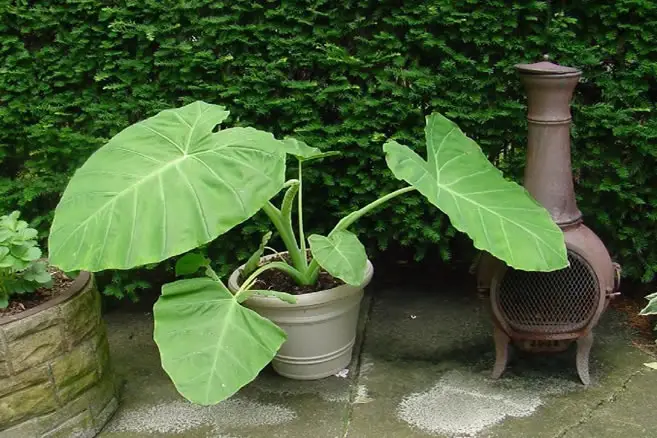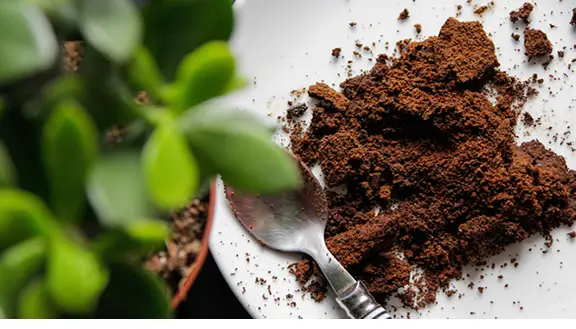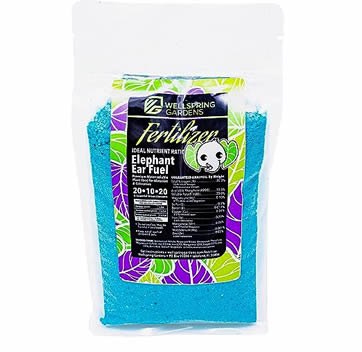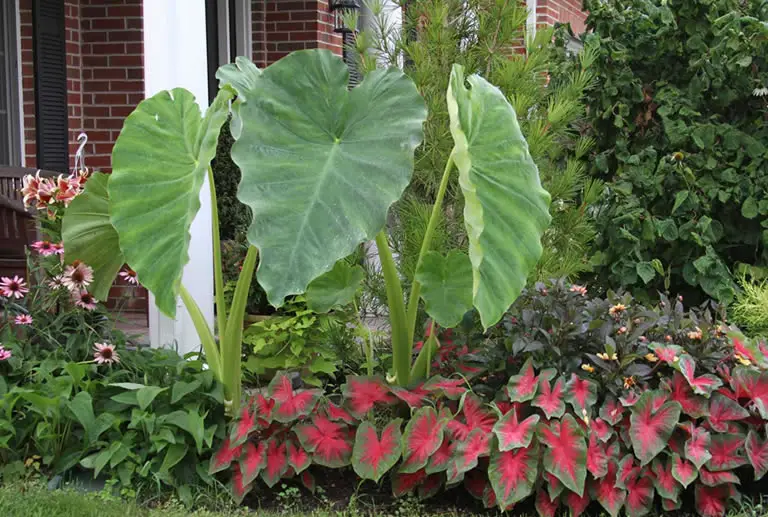Colocasia, more commonly known as the elephant ear plant, is part of the Araceae family. This large leafed flowering plant is native to the southeastern areas of Asia and can be found growing naturally through the Indian subcontinent.
Table of Contents
Are Coffee Grounds Good For Elephant Ear Plants?
It is a commonly held belief that ground coffee is a good fertilizer for plants. However, using them on your indoor elephant ear plants is not advised.
Coffee is not good for elephant ear plants.
Coffee can help to produce more nitrogen in the soil but due its anti-bacterial agents it will also kill the beneficial microbes the soil contains.
The elimination of soil microbes by the anti-bacterial agents in coffee and coffee grounds leads to a loss of nutrients in the soil thus restricting the growth of your elephant ear plant.
The Harsh Truth About Using Coffee As A Fertilizer For Elephant Ear Plants
There is a trend with online gardening enthusiasts (none of whom are professional gardeners or landscapers) to shout about the benefits of adding coffee beans and used ground coffee as a fertilizer for both garden plants and houseplants.
Although coffee does offer some benefits to the garden it can also cause a lot of problems in the soil.

Below I cover the benefits that ground coffee can offer your elephant ear plant as well as the problems it can cause.
Although this advise is given for elephant ears it equally applies to all outdoor garden plants and indoor houseplants, such as bird of paradise, rubber plants, snake plants and ferns for example.
The perceived pros of using coffee on elephant ears
It is true that coffee grounds can be used to add nitrogen to soil or to compost.
As nitrogen is sadly lacking in many suburban gardens adding more of it to the soil can only be a good thing.
There are people who swear by particular coffee brands, with some people going as far as visiting Starbucks for free samples.
But there is no particular brand that is better than any other.
All types of coffee will be digested and converted into nitrogen by the tiny microbes in the ground, though only in small quantities. I talk more about this later.
Another benefit of using coffee as a fertilizer, compared to other organic materials, is its lack of smell.
Anyone who keeps a compost pile knows only too well just how stinky it can be due to food waste such as left over dinners, unused vegetables and rotting potatoes.
This is one of the main reasons why I advocate the use of a compost bin.
What about using coffee grounds as a natural slug and snail deterrent?
There is an argument currently raging about the effectiveness of using coffee grounds as a natural pest control.
Just as there are many advocates for its effectiveness, there are just as many detractors.
In fact, there is growing scientific evidence to suggest that coffee grounds have no effect on plant pests at all.
And to be frank, there are much easier and more effective ways of dealing with slugs and snails in the garden both organically and chemically.
Some people will also say that using coffee grounds as a mulch is a good way to add moisture to the soil, but in reality a regular watering routine is the best source for that!
And, as you will see using coffee grounds as a mulch on elephant ears is actually not such a great idea.
So here is quick recap of the pros for using coffee as a plant fertilizer.
The 3 pros for using coffee on elephant ears:
- Can add nitrogen to the soil.
- Might kill snails and slugs.
- Adds additional moisture to soil.
The true cons of using coffee on elephant ear plants
As with all indoor and outdoor plants there are far more reasons not to use coffee as a fertilizer, or mulch, than there are reasons to use it.
Coffee grounds contain anti-bacterial qualities. Some people will tout this as a benefit because those anti-bacterial properties will help to kill pests in the soil.
However, there is a very negative side-effect to this.
Well, just as the anti-bacterial properties of coffee can help kill certain pests, it can also kill the beneficial microbes in the soil.
These microbes are responsible for creating the nutrients that your plant needs to thrive. So you really don’t want to reduce their numbers.

Without these microbes, nitrogen and nutrients are not created because there is no longer any process available by which organic material is converted into these essential elements.
It is the microbes that eat the organic matter and convert it into nitrogen and nutrients.
Too much coffee kills them.
Additionally, coffee has some allelopathic properties.
Plant allelopathy simply refers to the chemical warfare that occurs in the soil when one plant suppresses another in order to take all the resources for itself.
Some plants, including many vegetables, will be adversely affected by adding coffee grounds to the surrounding soil.
The caffeine in coffee also suppresses some plant growth and too much of it will suppress the growth of elephant ears.
There is at least one scientific study which demonstrates clearly that adding spent coffee grounds directly to urban agriculture soils greatly reduces plant growth.
How much, is too much?
Your guess is as good as mine, and at the end of the day, if you decide to add coffee to your elephant ears that is what you will be doing … guessing.
What about using coffee grounds as a mulch?
Many self-proclaimed gardening experts will testify to the beneficial effects of using coffee grounds as a mulch but the truth is, it is a terrible mulch!
Coffee grounds tend to compact and form a layer over the soil thus preventing both air and water from penetrating the soil and getting to plant roots.
If you use coffee grounds as a mulch around your elephant ear plant it will block moisture from getting to the plant.
There are, though, ways to minimize this effect.
For example, you can mix the coffee grounds with some other type of organic material, such as compost, before using it as a mulch.
You can, alternatively, rake the coffee grounds over the ground so it forms a thin top layer of soil only.
But really why would you go to all this trouble just to add a little nitrogen to the soil when you run the risk of causing the exact opposite thing from happening along with robbing the soil of nutrients?
There are easier ways to add nitrogen to your soil!
So here is quick recap of the cons for using coffee.
The cons for using coffee on elephant ears:
- Kills beneficial microbes in the soil.
- Can ultimately rob soil of more nitrogen than it adds.
- Can rob soil of nutrients.
- Coffee has some allelopathic properties that hinders plant growth.
- Coffee grounds harden and block both water and air from penetrating the soil.
As you can see from the above information that using coffee grounds as either a fertilizer or as a mulch is not the best idea.
Regardless of what amateur gardening “experts” tell you, using coffee grounds is not a good idea.
The people who seem to get great results from using coffee grounds as a fertilizer for their elephant ears will largely fall into two categories:
- They use coffee grounds very sparingly.
- They negate the negative effects of the coffee with fertilizer and other actions and are simply unaware that this process is happening.
Use This Instead Of Coffee – The Best Fertilizer For Elephant Ears
By far the best fertilizer for elephant ears is a 20-10-20 ratio like this one from Amazon which has been formulated specifically for elephant ears.
Another great fertilizer for elephant ears is this one from Master Blend.

A fertilizer with 20-10-20 ratio will add much more nitrogen to the soil than coffee grounds ever could without adding any of the negative anti-bacterial effects.
If you can’t get hold of either of the aforementioned brand fertilizers then any fertilizer with 20% nitrogen, 10% phosphorous and 20% potassium, and additional nutrients will be the best fertilizer for your elephant ear plant.
Takeaway: You Should Not Use Coffee On Elephant Ear Plants!
Coffee grounds can help to add much-needed nitrogen to the soil around your elephant ear plant.
There is no other real positive effects that coffee offers a plant.
Too much coffee grounds in the soil can have the opposite effect though and will actually rob the soil of nitrogen and also rob it of its nutrients.
Coffee grounds do this because they have anti-bacterial properties that kill the microbes in the soil that are responsible for converting organic matter into those elements.
As a mulch coffee grounds do not fair much better. Coffee grounds tend to compact and form an impassable barrier to both water and air robbing your elephant ears of both.
The truth is simple, avoid using coffee grounds unless you absolutely, positively, and without question, know just how much is enough.
I never use them.
There are much better ways to add nitrogen to the soil that do not run the risk of killing plants!

